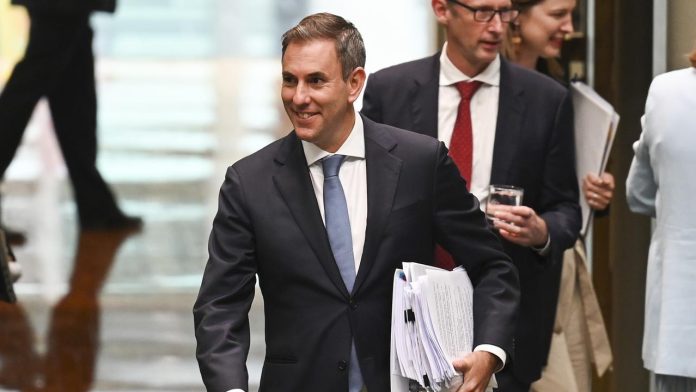[ad_1]
Treasurer Jim Chalmers is all but assured of delivering back-to-back surpluses, with new figures showing thumping revenue flows and tightened federal purse strings are set to keep the budget in the black.
The figures, released by the Department of Finance on Friday, showed the 2023-24 underlying cash balance to the end of March was in a deficit of $1.8bn — $4.1bn better than forecast in the mid-year economic outlook, released in December.
The better-than-expected reading brought the fiscal balance to a wafer thin deficit of just $339m.
While total receipts were $649m lower than forecast in MYEFO, the fall was far outweighed by a deduction in payments which was $4.8bn lower than predicted.
Dr Chalmers has fastidiously downplayed the prospect of a second surplus, however the strong position just three months out from the end of the financial year places the government in pole position to notch a second consecutive budget in the black.
“This update shows that while a second surplus is not locked in, it’s within reach,” Dr Chalmers said on Friday.
“There’s no doubt the degree of difficulty for the budget has gone up in recent weeks, made harder by uncertainty and volatility in the global economy.”
With the unemployment rate at near-record lows and inflation pushing workers’ wages into higher tax brackets, the budget has benefited from lower welfare payments and soaring personal income tax collections.
According to the finance documents, net debt in the first nine months of the 2024 financial year rose to $526.4bn, up from $520.5bn in February. It is expected to fall to $491bn by the middle of the year.
Weeks out from the budget, scheduled for May 14, a string of firmer-than-expected economic data, including fresh inflation and jobs numbers, has added to concerns that the Reserve Bank may have to resume its monetary tightening or at the very least delay rate cuts well into 2025.
On Friday, bond traders wildly recast their interest rate bets to ascribe a 52 per cent chance that RBA will increase the official cash rate to 5.6 per cent at its August meeting, marking a stark reversal of the 70 per cent odds of a cut at its December meeting earlier this week.
Jettisoning his interest rates forecast, Capital Economics’ Abhijit Surya said the RBA was more likely to hike than not at its next decision, scheduled for May 7.
“Given the material upside surprise in the CPI figures, we think there’s a solid case for the Bank to flip the switch and resume its tightening cycle,” he said.
With price pressures proving more stubborn than most had anticipated, Finance Minister Katy Gallagher said the budget would have a focus on fighting inflation.
“On the back of the first budget surplus in 15 years, it is important to ensure we’re doing what we can to put downward pressure on inflation,” she said.
“With the challenges in the economy growing in recent times, it’s more important than ever that we ensure we continue our focus on dealing with inflation in the near term and strengthening the economy in the long-term.”
The release of the finance figures coincided with renewed calls for increases to rent assistance, unemployment payments and childcare subsidies from the government’s own hand-picked economic inclusion advisory committee.
The committee, chaired by former Labor minister Jenny Macklin, called for the rate of Jobseeker, Youth Allowance and student assistance to be increased, and for a shake-up of existing employment services programs.
Responding to the release, Dr Chalmers sought to hose down expectations of a welfare boost amid fears that increased spending could exacerbate inflationary pressures.
“While we can’t fund every good idea and everything we would like to do, our record shows we have delivered responsible budgets as well as helping people doing it tough,” he said.
Shadow treasurer Angus Taylor also urged the Treasurer to exercise spending restraint to prevent a further acceleration in prices.
“The single biggest priority to achieve that is to have a budget handed down in a couple of weeks time that is an inflation fighting budget,” Mr Taylor told Nine Radio on Friday.
“That means getting off of Labor’s addiction to spending … that’s the way to beat inflation.”
Instead, support in the upcoming budget is widely expected to be limited to non-inflationary measures, such as energy bill relief, while also not taking away the attention from the assistance workers will receive via the overhauled stage three tax cuts.
[ad_2]
Source link


